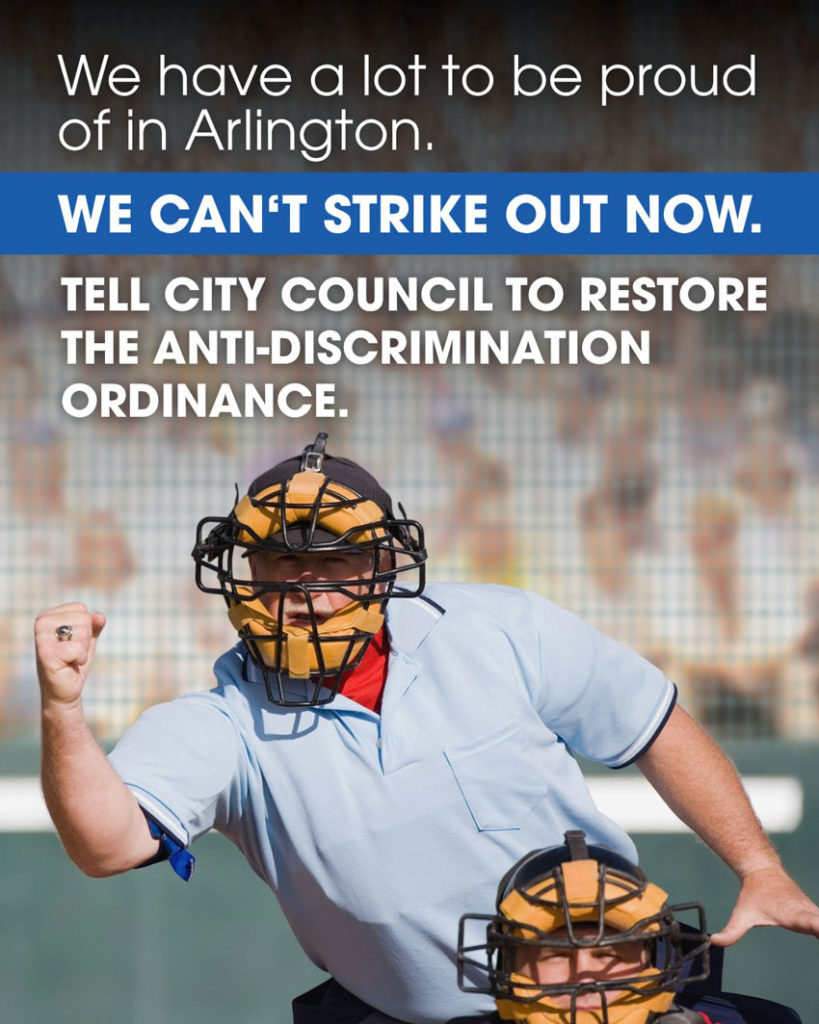The City of Arlington may become the first city in U.S. history to openly and legally reject the LGBTQ+ community.
Tomorrow (Tue, Nov 18), Arlington City Council will vote on removing sexual orientation and gender identity from the city’s antidiscrimination ordinance. Arlington City Attorney Molly Shortall recently told the council that removing the protections is necessary for $65 million in continued federal funding. Donald Trump has been strongarming institutions to drop any initiatives supportive of marginalized groups or risk losing federal monies because he feels personally threatened.
Many LGBTQ+ groups are saying Shortall is wrong.
“A profound misunderstanding of the law” is what was found via an independent review by Fort Worth attorney Daniel R. Barrett, because on July 29, an executive order and guidance from U.S. Attorney General Pam Bondi limit DEI programs, not antidiscrimination ordinances. The EO only requires compliance with federal antidiscrimination laws.
National antidiscrimination laws (not ordinances, which are local) were primarily enacted by Congress beginning with the Civil Rights Act of 1964, which prohibits discrimination based on race, color, religion, sex, or national origin and ensures equal treatment and opportunity for all citizens. The City of Arlington adopted its antidiscrimination ordinance in 2021, extending to Arlingtonians similar protections, specifically those related to sexual orientation and gender identity, in areas such as housing, employment, and public accommodations.
ArlingtonStrikesOut.com, a website owned by the nonprofit the Health Education Learning Project (HELP) (1919 8th Av, Fort Worth, 817-332-7722), says removing key protections isn’t just semantics on paper. There are real consequences. Along with putting already marginalized people at risk, legal liabilities are at play for the city.
“Arlington’s move to strip these protections isn’t just harmful,” said Todd Camp, founder and executive director of YesterQueer, the Tarrant County LGBTQ+ History Project. “It’s historic in the worst way.”
Arlington becoming the first U.S. city to end the protections “sends a message that basic safety and dignity are negotiable,” Camp added. “This is particularly heartbreaking considering how often Fort Worth has led the way on LGBTQ equality in Texas.”
Arlington’s neighbor to the west was the first in the state to add gender identity/expression to Fort Worth’s nondiscrimination ordinance and to create an official task force after the 2009 Rainbow Lounge raid. The Fort Worth Police Department also was one of the first in the state to adopt LGBTQ+ liaison officers and push for cultural competency training.
“These weren’t symbolic wins,” Camp said. “They made a genuine impact on people’s lives. Rolling back protections next door undermines decades of work from activists, civic leaders, and everyday residents who fought to make North Texas safer and more welcoming. It also puts Arlington on the wrong side of history at a moment when LGBTQ Texans are already facing heightened hostility. Cities should be expanding protections, not erasing them.”
For the council meeting at Arlington City Hall (101 W Abram St, Arlington, 817-265-3311), concerned citizens must prepare a 1-3-minute public comment, arrive before 6:30pm, sign up in front of council chambers, and indicate on the comment card that they’d like to speak.
You can also submit a written statement by simply completing a comment card in person. In either case, be sure to indicate clearly whether you are for or against ending protections in the antidiscrimination ordinance for sexual orientation and gender identity. You can also sign a petition at tinyurl.com/3vry9xk5.
UPDATE: Due to the recent death of former Arlington Mayor Elzie Odom, Arlington City Council opted to postpone the scheduled discussion of the Anti-Discrimination Ordinance until December out of respect for his family, including Councilmember Barbara Odom-Wesley, during this time of mourning. For updates on the future date, follow the HELP Center at [Facebook.com/HELPCenterTX]Facebook.com/HELPCenterTX.

Courtesy Health Education Learning Project












